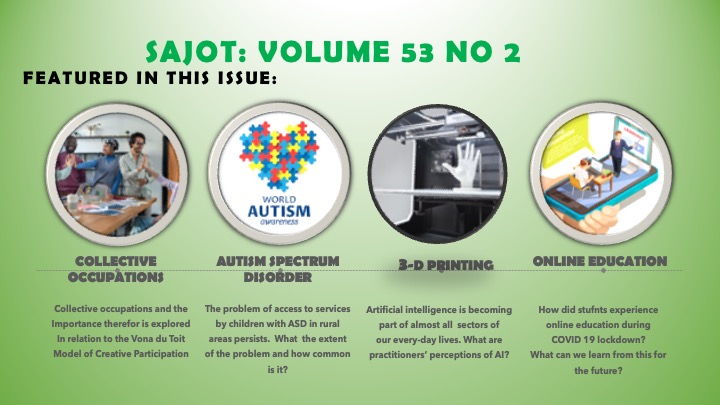Main Article Content
Decolonial turn of collective occupations in post-apartheid South Africa: Young people's voices of occupational legacy
Abstract
Background:
Collective occupations are a vital part of the postapartheid South African context because they enable parents and grandparents to pass on their legacies to the young people in families and communities. However, there are social intergenerational problems such as corruption, unemployment, family conflicts and poverty that disrupt the actions of inculcating occupational legacy.
Aim:
This study explored young people’s voices of occupational legacy in a post-apartheid South African context.
Method:
A socio-narratology qualitative inquiry was employed to gain insight from eight participants who were recruited using purposive sampling. Semi-structured interviews were conducted to collect data, which were analysed thematically in a credible process.
Results:
Five themes that amalgamated collective occupations with occupational legacy were identified: decoloniality of ‘knowledge generation and transfer’, decoloniality of ‘doing’, decoloniality of ‘being’, decoloniality of ‘becoming’ and decoloniality of ‘belonging’.
Conclusion:
The findings add to our understanding of the power of occupational legacy in ameliorating the problematic situations that enabled the young people’s continuity, social change and transformation through collective occupations. It is evident in the findings that the young people exerted maximal efforts to engage in occupational decision-making activities that were guided by the available opportunities so they may transition to the different contexts.
IMPLICATIONS FOR PRACTICE
Continued efforts for promoting coping mechanisms are needed in occupational therapy services provided in communities to develop targeted intervention aimed at fostering resilience among young people to adapt from the stressful situations and adverse. Ensuring appropriate wellness systems and intergenerational support for youth development should be a priority for occupational therapists to promote mental health and strengthen relationships and interdependence through collective actions to decrease anxiety, depression and stress.







